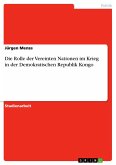Despite the fact that the word peacekeeping is not mentioned anywhere in the Charter of United Nations (UN), peacekeeping operations have traditionally placed high on the UN agenda. As one of the most visible of all UN activities, peacekeeping has also been a favorite subject of scholarly research and analysis. This book makes a twofold contribution to the debates about UN peacekeeping reforms. Firstly, it offers an alternative method of analysis of the past and future of UN peacekeeping - the capabilities-expectations gap analytical concept. Secondly, in addition to accessing the feasibility and implications of three basic options for bridging the existing UN capabilities-expectations gap - an increase of UN peacekeeping capabilities, a decrease of UN peacekeeping expectations, or a combination of the two - the second part of this volume examines whether regional and/or privatized peacekeeping operations represent viable alternative option(s) for bridging the capabilities-expectations gap of UN peacekeeping in the 21st century.
Bitte wählen Sie Ihr Anliegen aus.
Rechnungen
Retourenschein anfordern
Bestellstatus
Storno








